COLUMBIA, S.C. — Purchasing cards, also known as P-Cards, are used by government agencies to make it easier for employees to purchase needed items like supplies, equipment, and gas.
South Carolina's Comptroller General oversees the P-card program throughout the state.
"They're only used as a transaction vehicle to cut down on some of the paperwork that is normally associated with a small purchase," said Comptroller General Richard Eckstrom.
Eckstrom said while the spending system is convenient, it is also high-risk for fraud and misspending.
"They're easy to misuse. We try to anticipate categories of misuse by blocking the ability of a cardholder to use at certain businesses for instance," said Eckstrom.
According to Eckstrom, businesses that are blocked include liquor stores, tattoo parlors and even some food and grocery stores. However, he said sometimes the merchant code does not identify everything the merchant sells, resulting in a possible purchase that is not allowed.
"The only way we'd know about it would be by looking at the detailed paperwork to see what it was that was purchased," said Eckstrom.
Every state agency is required to follow state p-card policies and procedures. The State Fiscal Accountability Authority (SFAA) approves school district procurement codes, which include p-card use.
According to the SFAA's website, "The P-Card Program (Program) utilizes a VISA© purchasing card issued by Bank of America. The terms of the contract with the Bank also permit Counties and Local Political Subdivisions to use the P-Card. "
Eckstrom explained there is no limit of how many P-Cards a state agency or a school district can have.
"We've seen instances where individuals have been assigned dozens and dozens, up toward 100 cards to oversee," said Eckstrom.
He said the more cards an agency has, the harder it is to oversee spending, which could result in fraud or misused funds.
Residents like Richard Moore say when it comes to taxpayer dollars, transparency and accountability are crucial.
“Anytime there is a problem that someone has abused a financial obligation, it just makes it look real bad and you lose faith from the taxpayers," said Moore.
Eckstrom's office publishes monthly reports outlining every state agency's P-card purchases.
"I think it's useful to have that information out there so that if there is a set of eyes that wants to look at it, they can look and they can ask questions," said Eckstrom.
School districts are also required by law to publish their monthly p-card statements.
Residents can report fraud to the Comptroller General's office here.

